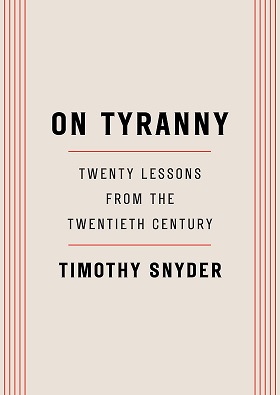Review: On Tyranny

“To abandon facts is to abandon freedom. If nothing is true, then no one can criticize power, because there is no basis upon which to do so. If nothing is true, then all is spectacle. The biggest wallet pays for the most blinding lights.”
Few may know this, but Timothy Snyder’s book actually originated with a Facebook post he published back on November 15, 2016 — one week after Donald Trump’s election. “Americans,” it began, “are no wiser than the Europeans who saw democracy yield to fascism, Nazism, or communism. Our one advantage is that we might learn from their experience.” Those wise words on how to oppose fascism were then expanded into a pamphlet of sorts, a timely DIY-style guide on how to defend democracy at home.
You can read the bulletin in its original form at the link above if you want a taste of the lessons imparted here. Rest assured, this isn’t one that you read once and put back on the shelf, never to visit again. Given the trajectory of the last two years, I find myself picking it back up from time to time, simultaneously awestruck and discouraged to find how relevant are its warnings and exhortations. As a reviewer on Goodreads so eloquently put it: “No matter your politics, fascism and authoritarianism arise when we’re looking another way, distracted, numb to history. The only way to get out in front of and stop a tyrant is to know what we’re looking for. A book like this can save our country and unite us toward a common goal of change, of striving for democracy, and protect us from the dangers of our own rotten impulses.”
The rise of fascism and Nazism that gripped our grandparents’ generation, and the historical contexts in which they emerged, offer a bounty of insight into understanding our present political and social order and the foreseeable means by which they can unravel. Never has there been a better reason to arm ourselves with the knowledge of the recent past than that we might anticipate and oppose budding incursions into civil liberties and free society.
The onslaught of corruption and incompetence evidenced in the current administration has failed to register much more than a hint of surprise among those of us who expressed concern from the beginning. For anyone familiar with the undemocratic maneuvers favoring the autocratic regimes of the previous century, warning signs were everywhere. As a friend remarked at the time, the early indicators of abnormalcy gleamed “like a flashing light at a railroad crossing.” When we referred to the despot-elect as a fascist, we meant it rather as a noun, not an adjective. We didn’t want to be right, but neither were we willing to bet our democracy that we were wrong.
A unilateral power play here, another broken norm there. As examples of executive misconduct stack up and political rivalries intensify, we find ourselves faced with a momentous decision as a nation. Do we continue on this foundering rollercoaster on the assumption we can disembark at will? This is a question that seems scarcely entertained by the president’s most fervid surrogates. Those continuing to pledge their steadfast support dawdle and dither with denial and deflection, chalking up the president’s around the clock imprudence to unorthodox methods and a heavy touch, and in so doing have all but lost their sense of right and wrong. The historical parallels here, as Snyder so poignantly conveys throughout this guidebook, are unmistakable.
Hitler, lest we never forget, also campaigned on a raft of false promises and hyper-nationalist bigotry. Like 45, he tapped into a disaffected bloc seeking economic restitution. And as we’re observing from our front-row seats in the Trump era, businessmen, politicians, and intellectuals at the time endorsed their demagogue du jour so as not to deviate too sharply from public opinion. They rationalized by telling themselves that Hitler’s wilder promises would never come to pass — that there were bigger issues at stake. How do we look back now at the millions of Germans who supported history’s darkest figure?
Normalization is the last gasp of democracy. Prewar Germany was filled with well meaning citizens as wise and as reasonable as today’s electorate who brushed off Hitler’s anti-Semitism and ethno-nationalist rhetoric as all posture and bravado with no bite. As a result, their institutions and their society gradually but surely slid virtually unnoticed from a state of normalcy in which freedoms were taken for granted into explicit despotism. What happened then can happen now. Indeed, if recent events have shown us anything, it’s that our political system and its outdated institutions are vulnerable to the kind of undoing authoritarians are especially primed to exploit. Our vulnerabilities are different from those of 1930s Europe, but the institutions on which we rely are susceptible all the same to bad actors and extreme partisanism.
The sweep of history unfolds over time, not overnight, something we as prisoners of the present tend to forget. Thankfully, the lessons and protocols haven’t changed. I found Snyder’s shrewd wisdoms inspiring, so much so that I fashioned them into a few of my own.
Resist the impulse to normalize. Lest desensitization and apathy set in, cling to your sense of outrage and keep it as well honed as the day is long. A loss of the latter will only ease the former along in historically dangerous directions.
When not guided by logic and reason, any fiction can be your reality. Indeed, an assault on truth and fact-based communication is fundamental to authoritarian regime changes throughout history. Adhere to facts and refuse to acquiesce to “alternative” unevidenced realities. Rebuff sophists in power who deliberately abuse the norms of civil discussion. Treat truth as the virtue that it is and reject con-man attempts to paint what is true as partisan fancy.
A compromise on or renunciation of verifiable reality is the most fatal step on the path to an undemocratic future. Rerouting from the current trajectory starts with civil resistance and noncompliance on the part of elected leaders, government workers, and ordinary citizens like you and me. As the past century’s European societies illustrate, the stakes couldn’t be higher.
I’ll close with two of my favorite quotes from this stunningly important book:
“Figure things out for yourself. Spend more time with long articles. Subsidize investigative journalism by subscribing to print media. Realize that some of what is on the internet is there to harm you. Learn about sites that investigate propaganda campaigns (some of which come from abroad). Take responsibility for what you communicate with others.” (p. 72)
“Stand out. It is easy to follow along. It can feel strange to do or say something different. But without that unease, there is no freedom. Remember Rosa Parks. The moment you set an example, the spell of the status quo is broken, and others will follow.” (p. 51)
For more discussion of this book and the urgency of its insights, see this interview with the author at Vox.
Note: This review is mirrored over at Goodreads and at Amazon.
Further reading and resources:
-
- Strength Through Unity: How To Spot Fascism Before It’s Too Late
- The Road to Tyranny
- We overanalyze Trump. He is what he appears to be.
- Autocracy: Rules for Survival
- How to preserve the ideals of liberal democracy in the face of a Trump presidency
- This Is Not Normal
- Trump won, and Amy Siskind started a list of changes. Now it’s a sensation.
- The War on Facts Is a War on Democracy
- How did Hitler rise to power?
- Hitler’s Rise to Power
- The American Abyss: “Post-truth is pre-fascism, and Trump has been our post-truth president. When we give up on truth, we concede power to those with the wealth and charisma to create spectacle in its place. Without agreement about some basic facts, citizens cannot form the civil society that would allow them to defend themselves. If we lose the institutions that produce facts that are pertinent to us, then we tend to wallow in attractive abstractions and fictions.”
Image credit: ALBERT ZAWADA, AGENCJA GAZETA



Comments